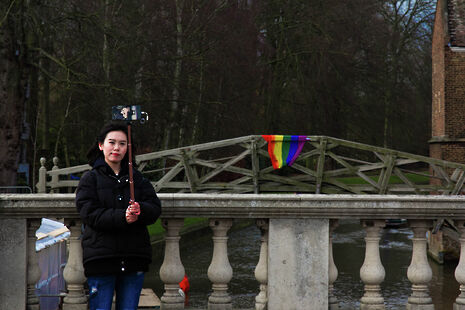Cambridge celebrates LGBT History Month
Colleges have raised LGBT+ flags and events are planned to span the month

Rainbow flags are being flown across Cambridge, and by many Cambridge colleges, in celebration of LGBT History Month.
The month aims to highlight the history and experience of the LGBT+ community, and promote awareness of the issues faced by those who identify as LGBT+.
For some colleges, including Peterhouse and Darwin, this is the first year in which the flags will be flown.
Tom Ashford, President of the CUSU LGBT+ committee, told Varsity: “Being able to walk through central Cambridge and see the flags being flown is a genuinely validating and heartwarming experience. Despite incredible progress made by the LGBT+ movement, LGBT+ people here in Cambridge are still often marginalised and misunderstood, and as such I hope the raising of the flags serves as a significant gesture of solidarity with all LGBT+ members of the university, both students and staff.”
They suggested that it would be reassuring for potential applicants who otherwise may “perceive the University to be old-fashioned or overly conservative”.
Ashford generally praised the University’s response to the month, saying: “Colleges which have refused to fly the flag have still been keen to get involved in some way, hanging flags in porter’s lodges and bars, posting support online, and even constructing temporary flagpoles.
“College councils being stubborn about the issue is regrettable, but it’s not in the spirit of the day to complain, and we’ll continue to pester them for the next 12 months and hopefully have all colleges participating next year.”
Katie Nelson is the LGBT+ rep for Emmanuel College and was involved in the organisation of the college’s flag-flying. She told Varsity: “For many, university is the first community that students decide to be themselves. Raising the Pride flag during history month is a small but significant gesture to make LGBT+ students feel welcome.”
She expressed regret that the college had rejected the proposal to fly the flag on the main flag pole, but was pleased with the eventual compromise: “College agreed to construct a new flag pole instead, and to project rainbow lights onto our chapel during the dark hours.”
She praised the student response to the issue, saying that “support from the student body in Emmanuel was patent” and had demonstrated to the college “that the entire student body supported raising the flag, not just the small minority of its LGBT+ members.”
She added: “Emmanuel has gone from rejecting flag proposals to flying the pride flag visible from St. Andrews street and projecting rainbow lights on the chapel. I’m extremely proud that they have decided to show their support for LGBT+ members in such a visible way, particularly in this political climate.
“It’s disappointing that other Colleges are still unmoving in their position to not fly the flag, I would suggest that reps keep pushing, as I’m sure they are, and to not underestimate their negotiation capacities. Increasingly, the absence of a flag will be viewed as a political statement, which may well affect both the College’s reputation but also their applications.”
The rainbow flag, also known as the LGBT+ pride flag, represents diversity. It was created by in the 1970s by Gilbert Baker, and is a common sight at pride parades.
Many other events also have been planned in Cambridge for the month, ranging from talks to socials.
One event is with asexual activist George Norman, on the history of asexuality and raising awareness of those who are asexual or aromantic.
Lola Phoenix, a non-binary queer activist, and Aderonke Apata, a Nigerian LGBT+ rights activist who was denied asylum in the UK when a judge refused to accept her sexuality, will also run a talk on queer identity.
From the 10th to the 15th February, Shire Hall will be lit up in rainbow colours as part of the e-Luminate Festival, and on the 11th there will be a walking tour of the LGBT history of Cambridge
 Features / Should I stay or should I go? Cambridge students and alumni reflect on how their memories stay with them15 December 2025
Features / Should I stay or should I go? Cambridge students and alumni reflect on how their memories stay with them15 December 2025 News / Cambridge study finds students learn better with notes than AI13 December 2025
News / Cambridge study finds students learn better with notes than AI13 December 2025 News / Dons warn PM about Vet School closure16 December 2025
News / Dons warn PM about Vet School closure16 December 2025 News / News In Brief: Michaelmas marriages, monogamous mammals, and messaging manipulation15 December 2025
News / News In Brief: Michaelmas marriages, monogamous mammals, and messaging manipulation15 December 2025 Comment / The magic of an eight-week term15 December 2025
Comment / The magic of an eight-week term15 December 2025








